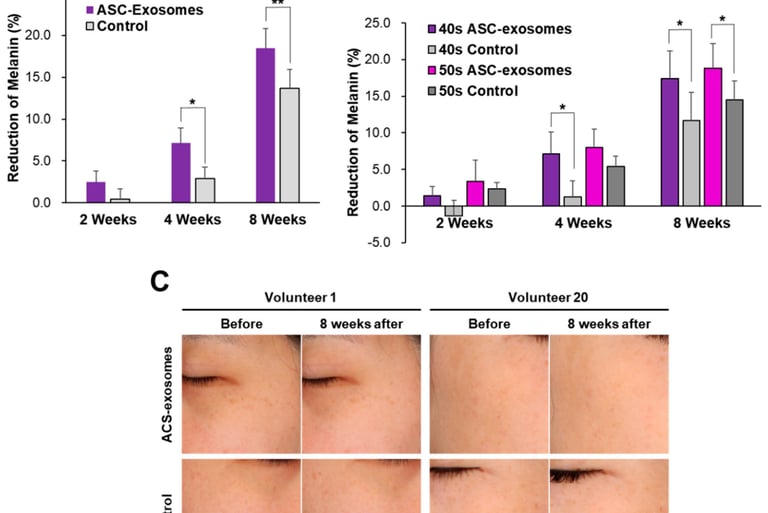Skin Brightening Efficacy of Exosomes: A Prospective, Split-Face, Randomized Placebo-Controlled Study
2 min read
Hyperpigmentation continues to be a primary concern for numerous clients, fueling a global skin brightening market anticipated to reach USD 13.7 billion by 2025. While established treatments such as hydroquinone and vitamin C remain relevant, the demand for innovative, safe, and highly effective alternatives persists. Emerging research into exosomes presents a promising new frontier for aesthetic professionals.
You may have encountered anecdotal evidence and observed compelling before-and-after images associated with exosome treatments. However, a healthy skepticism regarding these claims is natural, leading to questions about the rigorous scientific validation of exosome efficacy in skin brightening.
To address this, let's take a look at one of such studies: "Skin Brightening Efficacy of Exosomes Derived from Human Adipose Tissue-Derived Stem/Stromal Cells: A Prospective, Split-Face, Randomized Placebo-Controlled Study" Byong Seung Cho, etc 2020, Cosmetics 2020, 7(4), 90
Key Findings from the Research
A prospective, split-face, double-blind, randomized placebo-controlled study evaluated a cosmetic formulation containing ASC-exosomes on 21 female volunteers with hyperpigmentation. Here’s what the research revealed:
In Vitro Efficacy: ASC-exosomes effectively reduced intracellular melanin levels in melanoma cells in laboratory settings, both with and without melanin-stimulating hormones. This suggests a direct anti-pigmentation effect at the cellular level.
Clinical Potential: In the human clinical study, the ASC-exosome-containing formulation statistically decreased melanin content compared to a placebo. Reductions were observed as early as 2 weeks, becoming statistically significant by 4 weeks of twice-daily application.
Age-Related Response: The melanin reduction was more pronounced in women under 50 years of age, particularly evident after 4 weeks of treatment.
Safety Profile: Importantly, no adverse effects were reported by any volunteers during the 8-week study period.
Avenues for Improvement: While promising, the study noted that the melanin-reducing activity was limited and diminished over time (by week 8). Researchers suggest that improved transdermal delivery methods for ASC-exosomes could lead to more profound and sustained results, similar to the strong effects seen in vitro.


Implications for Aesthetic Professionals
These findings suggest that exosomes could become a valuable ingredient in advanced skin brightening treatments. For aesthetic professionals, this opens doors to:
Novel Treatment Options: Offering clients cutting-edge solutions for hyperpigmentation that leverage the regenerative and anti-pigmentation properties of exosomes.
Targeted Approaches: Considering ASC-exosome-based products, especially for clients experiencing hyperpigmentation, with potentially better results for those under 50.
Combination Therapies: Exploring how ASC-exosomes might complement existing treatments, especially as transdermal delivery methods continue to advance (e.g., microneedling, iontophoresis).
Client Education: Being prepared to discuss the science behind exosomes and their potential benefits, managing expectations regarding results and the need for consistent application.
Disclaimer: The information provided on this website is for educational purposes only and is not intended as medical advice. No exosome product discussed or referenced herein has been approved by the U.S. Food and Drug Administration (FDA). Individuals seeking medical advice or treatment should consult with a qualified healthcare professional.